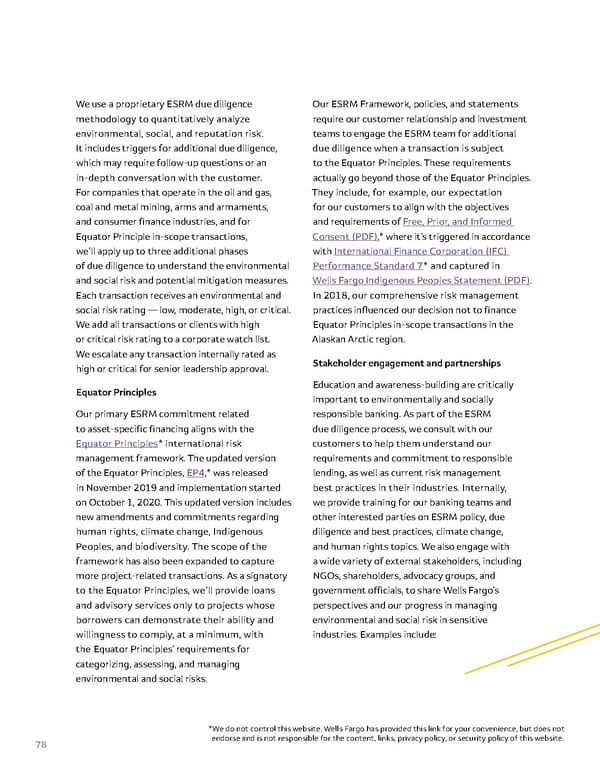78 We use a proprietary ESRM due diligence methodology to quantitatively analyze environmental, social, and reputation risk . It includes triggers for additional due diligence, which may require follow-up questions or an in-depth conversation with the customer . For companies that operate in the oil and gas, coal and metal mining, arms and armaments, and consumer finance industries, and for Equator Principle in-scope transactions, we’ll apply up to three additional phases of due diligence to understand the environmental and social risk and potential mitigation measures . Each transaction receives an environmental and social risk rating — low, moderate, high, or critical . We add all transactions or clients with high or critical risk rating to a corporate watch list . We escalate any transaction internally rated as high or critical for senior leadership approval . Equator Principles Our primary ESRM commitment related to asset-specific financing aligns with the Equator Principles * international risk management framework . The updated version of the Equator Principles, EP4 , * was released in November 2019 and implementation started on October 1, 2020 . This updated version includes new amendments and commitments regarding human rights, climate change, Indigenous Peoples, and biodiversity . The scope of the framework has also been expanded to capture more project-related transactions . As a signatory to the Equator Principles, we’ll provide loans and advisory services only to projects whose borrowers can demonstrate their ability and willingness to comply, at a minimum, with the Equator Principles’ requirements for categorizing, assessing, and managing environmental and social risks . Our ESRM Framework, policies, and statements require our customer relationship and investment teams to engage the ESRM team for additional due diligence when a transaction is subject to the Equator Principles . These requirements actually go beyond those of the Equator Principles . They include, for example, our expectation for our customers to align with the objectives and requirements of Free, Prior, and Informed Consent (PDF) ,* where it’s triggered in accordance with International Finance Corporation (IFC) Performance Standard 7 * and captured in Wells Fargo Indigenous Peoples Statement (PDF) . In 2018, our comprehensive risk management practices influenced our decision not to finance Equator Principles in-scope transactions in the Alaskan Arctic region . Stakeholder engagement and partnerships Education and awareness-building are critically important to environmentally and socially responsible banking . As part of the ESRM due diligence process, we consult with our customers to help them understand our requirements and commitment to responsible lending, as well as current risk management best practices in their industries . Internally, we provide training for our banking teams and other interested parties on ESRM policy, due diligence and best practices, climate change, and human rights topics . We also engage with a wide variety of external stakeholders, including NGOs, shareholders, advocacy groups, and government officials, to share Wells Fargo’s perspectives and our progress in managing environmental and social risk in sensitive industries . Examples include: *We do not control this website . Wells Fargo has provided this link for your convenience, but does not endorse and is not responsible for the content, links, privacy policy, or security policy of this website .
 Wells Fargo ESG Report Page 77 Page 79
Wells Fargo ESG Report Page 77 Page 79